stdClass Object
(
[id] => 16238
[title] => An immense purity is what remains in the end
[alias] => an-immense-sincerity-is-what-remains-in-the-end
[introtext] => Greater Than Guilt/31 - You can be "king" if you don't stop being a son
by Luigino Bruni
published in Avvenire on 19/08/2018
 «Io non vivo in me ma fuori
«Io non vivo in me ma fuori
Io sono manchevole io faccio
continuamente errori
Non so perché forse non più degli altri
Ma a me pare di farne di più…
Oh fuori ci sono gli alberi
Ci sono gli uccelli e i fiori..»
Nicola Gardini, Io non vivo in me ma fuori
“Now these are the last words of David: »...The Spirit of the Lord speaks by me; / his word is on my tongue. ... [he] has said to me: When one rules justly over men, / ruling in the fear of God, / he dawns on them like the morning light, / like the sun shining forth on a cloudless morning, / like rain that makes grass to sprout from the earth«” (2 Samuel 23:1-4). Although David will still speak in the Bible (in the First Book of Kings), for the Books of Samuel these are "David's last words"; they are like a testament. Here King David speaks as a prophet, as one who has received a new language to announce (in his case even sing) the word of YHWH - and he will finish the book as a priest. The author knows that we too, having reached the end of his life, can testify that David did speak some different and higher words than his or our own. He spoke them by mixing them up with words that were low, lower and more cowardly than ours; but in David God spoke precisely from the wounds of his ambivalent humanity.
[fulltext] => After these last words, the text reports some episodes from David’s life, placed - by their nature and their messages - at the epilogue of his story. The first one is a strange thirst of David for Bethlehem: “And David said longingly, »Oh, that someone would give me water to drink from the well of Bethlehem that is by the gate!« Then the three mighty men broke through the camp of the Philistines and drew water out of the well of Bethlehem that was by the gate and carried and brought it to David. But he would not drink of it” (23:15-16). It’s a complicated episode which tells us something else about kings who are much loved by their people. These people often enjoy such veneration and devotion in their community that their followers do everything possible and even impossible to meet the needs of their "king", trying to anticipate their desires, and not infrequently even their whims. This type of charismatic leader knows very well that they have that kind of spell over their faithful people, and are very tempted to use it and abuse it. This story shows us how different David’s heart is: he too is tempted by his whim and gives in, but he knows how to repent, change his mind and make a gesture of loyalty to his men.
This episode of the water is set within the presentation of the thirty or so warriors around David, his special guards. The most important detail of this list of military and heroic deeds is the last name, the one that closes the list: “Uriah the Hittite” (23:39), the loyal soldier killed by David so as to take his wife Bathsheba (ch. 11). The author is not afraid to seal the military parade of David with the name whose mere pronunciation speaks more to the biblical reader than a treatise on theology. YHWH's mercy and predilection for David, the beloved king, poet and singer of stupendous psalms, was greater than his sin. But the Bible wanted to preserve the name of Uriah until the very end; it did not erase it from the register of David’s life story, from the catalogue of life and death. To remind us that great sins dig scars that mark and change our bodies forever. Every time we read the Bible and pronounce the name of Uriah, David is again made responsible for that sin - forgiven but not irresponsible.
The second episode is about the census. For some mysterious anger of his, YHWH "incited David against them [the people of Israel], saying, »Go, number Israel and Judah«” (24:1). God "incites" David to act badly against his people, he "leads him into temptation" - indeed, the whole of the Bible is there in the prayer of Our Father. David gives in to this push, and Joab completes the census: “in Israel there were 800,000 valiant men who drew the sword, and the men of Judah were 500,000” (24:9). But after the census, David felt remorse and said: “I have sinned greatly in what I have done” (24:10). Why was a census a "great evil"? Numbers in that Middle Eastern world had a mysterious and magical meaning. To know the "number" of a reality meant to possess its mystery, to be able to use it and manipulate it, too. Moving from quality (the people) to quantity (their number) reduces the degrees of freedom, leaving all the other dimensions on the roadside except the one contained in that number, almost always the most banal one because it is the simplest. So it is with the census: counting people means manifesting a will to dominate, a spirit of possession of the "things" that you count, to say that you are their master. Yesterday and today. In biblical humanism the king is not the master of his people, and therefore that census had a strong theological value: it denied the sovereignty of YHWH over his people. The sin of idolatry crept into those numbers - in ideal-driven and spiritual communities, counting one's own people always has a theological value, it reveals a will for power, it puts the gratuitousness and chastity of the founders and leaders into crisis.
In response to David's repentance, YHWH sends word to him through Gad (a seer-prophet): “Three things I offer you. Choose one of them, that I may do it to you. (…) Shall seven years of famine come to you in your land? Or will you flee three months before your foes while they pursue you? Or shall there be three days' pestilence in your land? (24:12-13). David asked to avoid fleeing from the enemy, and God sent a plague that killed seventy thousand people. David offers himself to save his flock: “Behold, I have sinned, and I have done wickedly. But these sheep, what have they done? Please let your hand be against me” (24:17). As a response to his offering, Gad conveys God's response to David again: “Go up, raise an altar to the Lord on the threshing floor of Araunah the Jebusite” (24:18). That farmyard, the place for threshing, breeding and killing animals, now becomes the altar of David the priest, and later the place where Solomon builds his temple - in my Italian dialect the farmyard (aia) is called the altar (ara), using the Latin word for altar (perhaps because of the same interweaving of death and life in it). Araunah declares himself ready to donate the oxen for the holocaust and the wood for the fire to his king. But David replies: “No, but I will buy it from you for a price. I will not offer burnt offerings to the Lord my God that cost me nothing.” So David bought the threshing floor and the oxen for fifty shekels of silver” (24:24). This dialogue closely recalls Abraham and his contract with the Hittites for the purchase of Sarah's tomb (Genesis 23); but also the name of Uriah the Hittite. For that tomb Abraham paid 400 shekels of silver; now the price is 50. The author (a later and more ideological one) of the First Book of Chronicles (21:25) will not be satisfied with this small figure, he will multiply it by twelve and the silver will become gold ("600 shekels of gold"). Yet that modest figure quoted by that ancient writer is very beautiful, perhaps telling us that no temple is worth a wife, and that the land for a temple that contains the Ark of the Covenant is worth an eighth of the land that contains a spouse.
In this last episode, the great theme of economic faith returns, too. Sacrifices to God are not worthwhile if they do not have a price, if they are free of any cost. This religious vision considers gratuitousness a bad currency and believes that God does not appreciate gifts that cost anything. The idea is rooted very deeply in our social relations, too (which leads us, for example, not to value gifts that are known to be recycled), and people wanted to extend it also to the relationship with the divinity, thus imprisoning God, too, in our commercial logic - when will we release him? But this last chapter tells us, once again, that the Bible loved David for his ability to repent and to start over after making mistakes. David was not wonderful and loved for his moral life, but for his mysterious, almost infantile candour. For that primitive purity of the shepherd boy that the sin of the adult man was not able to erase, and which remained greater than his guilt. To be able to give us the most important message in David's story: that mysterious candour and that childlike innocence resist tenaciously and work in each one of us. We too are greater than our own guilt - and we must remember this especially at a time of great faults, both our own and those of others.
David entered the Bible as a boy, and, in a sense, that boy has never left the scene. He knew how to dialogue with women, he listened to the voice of the prophets and the Spirit, he felt respect for his "father" Saul, he sang, he composed hymns and poetry, he cried. David, the king and the greatest father, was so great because he never stopped being a son. Perhaps that is why he has been and continues to be so loved. According to the biblical tradition, Araunah's farmyard-altar was located on Mount Moriah, where an angel of God saved another innocent son. Because God and we, too, love many things, but above all we love our children.
And this time too, thank God, we have reached the end. On Sunday 2 September we are going to start with a new series about ideal-driven organisations, and the people who generate them and work in them. As always and each time in a different way, I wish to thank those who have tried to follow me during these thirty-one weeks. Thanks to the director, Marco Tarquinio, the first reader of each of my lines, the one who allows this dialogue between an economist and the Bible to continue and, perhaps, mature. Thanks to those who wrote to me, encouraged me, criticised me, sometimes in really splendid words. It was a long commentary, full of encounters. And as it happens in every reading of the Bible, the people we meet along the way do not disappear when we pass them over. They remain alive, speak, introduce and present further encounters, and they join us on our journey, until the last encounter. And so, at the end of the journey, we find ourselves in an area populated by all the men and women we have got to know on the way. Here too lies the beauty of great literature, and, in a special way, of the Bible. In that threshing floor of Araunah, though invisibly, Hannah, Samuel, Eli and his children, Saul, Jonathan, Bathsheba, Abigail, Rizpah, the witch of Endor, the two wise women, Joab, Absalom and Amnon were there, too. Tamar and Uriah were also there, along with many other victims whose tombstones the Bible preserves for us. And it offers us its words to pray when we have exhausted ours; or when, as in these days in Genoa, too much pain is taking our breath away.
download article in pdf
[checked_out] => 0
[checked_out_time] => 0000-00-00 00:00:00
[catid] => 847
[created] => 2018-08-19 08:00:00
[created_by] => 64
[created_by_alias] => Luigino Bruni
[state] => 1
[modified] => 2020-08-23 18:41:25
[modified_by] => 609
[modified_by_name] => Super User
[publish_up] => 2018-08-24 08:00:00
[publish_down] => 0000-00-00 00:00:00
[images] => {"image_intro":"","float_intro":"","image_intro_alt":"","image_intro_caption":"","image_fulltext":"","float_fulltext":"","image_fulltext_alt":"","image_fulltext_caption":""}
[urls] => {"urla":false,"urlatext":"","targeta":"","urlb":false,"urlbtext":"","targetb":"","urlc":false,"urlctext":"","targetc":""}
[attribs] => {"article_layout":"","show_title":"","link_titles":"","show_tags":"","show_intro":"","info_block_position":"","info_block_show_title":"","show_category":"","link_category":"","show_parent_category":"","link_parent_category":"","show_associations":"","show_author":"","link_author":"","show_create_date":"","show_modify_date":"","show_publish_date":"","show_item_navigation":"","show_icons":"","show_print_icon":"","show_email_icon":"","show_vote":"","show_hits":"","show_noauth":"","urls_position":"","alternative_readmore":"","article_page_title":"","show_publishing_options":"","show_article_options":"","show_urls_images_backend":"","show_urls_images_frontend":""}
[metadata] => {"robots":"","author":"","rights":"","xreference":""}
[metakey] =>
[metadesc] => The conclusion of the Books of Samuel is a synthesis and distillation of many themes. Above all it reminds us of the reasons for the great love the Bible had and still has for David.
[access] => 1
[hits] => 2322
[xreference] =>
[featured] => 0
[language] => en-GB
[on_img_default] =>
[readmore] => 10035
[ordering] => 63
[category_title] => EN - Greater Than Guilt
[category_route] => commenti-biblici/serie-bibliche/piu-grandi-della-colpa
[category_access] => 1
[category_alias] => en-greater-than-guilt
[published] => 1
[parents_published] => 1
[lft] => 129
[author] => Luigino Bruni
[author_email] => ferrucci.anto@gmail.com
[parent_title] => IT - Serie bibliche
[parent_id] => 773
[parent_route] => commenti-biblici/serie-bibliche
[parent_alias] => serie-bibliche
[rating] => 0
[rating_count] => 0
[alternative_readmore] =>
[layout] =>
[params] => Joomla\Registry\Registry Object
(
[data:protected] => stdClass Object
(
[article_layout] => _:default
[show_title] => 1
[link_titles] => 1
[show_intro] => 1
[info_block_position] => 0
[info_block_show_title] => 1
[show_category] => 1
[link_category] => 1
[show_parent_category] => 1
[link_parent_category] => 1
[show_associations] => 0
[flags] => 1
[show_author] => 0
[link_author] => 0
[show_create_date] => 1
[show_modify_date] => 0
[show_publish_date] => 1
[show_item_navigation] => 1
[show_vote] => 0
[show_readmore] => 0
[show_readmore_title] => 0
[readmore_limit] => 100
[show_tags] => 1
[show_icons] => 1
[show_print_icon] => 1
[show_email_icon] => 1
[show_hits] => 0
[record_hits] => 1
[show_noauth] => 0
[urls_position] => 1
[captcha] =>
[show_publishing_options] => 1
[show_article_options] => 1
[save_history] => 1
[history_limit] => 10
[show_urls_images_frontend] => 0
[show_urls_images_backend] => 1
[targeta] => 0
[targetb] => 0
[targetc] => 0
[float_intro] => left
[float_fulltext] => left
[category_layout] => _:blog
[show_category_heading_title_text] => 0
[show_category_title] => 0
[show_description] => 0
[show_description_image] => 0
[maxLevel] => 0
[show_empty_categories] => 0
[show_no_articles] => 1
[show_subcat_desc] => 0
[show_cat_num_articles] => 0
[show_cat_tags] => 1
[show_base_description] => 1
[maxLevelcat] => -1
[show_empty_categories_cat] => 0
[show_subcat_desc_cat] => 0
[show_cat_num_articles_cat] => 0
[num_leading_articles] => 0
[num_intro_articles] => 14
[num_columns] => 2
[num_links] => 0
[multi_column_order] => 1
[show_subcategory_content] => -1
[show_pagination_limit] => 1
[filter_field] => hide
[show_headings] => 1
[list_show_date] => 0
[date_format] =>
[list_show_hits] => 1
[list_show_author] => 1
[list_show_votes] => 0
[list_show_ratings] => 0
[orderby_pri] => none
[orderby_sec] => rdate
[order_date] => published
[show_pagination] => 2
[show_pagination_results] => 1
[show_featured] => show
[show_feed_link] => 1
[feed_summary] => 0
[feed_show_readmore] => 0
[sef_advanced] => 1
[sef_ids] => 1
[custom_fields_enable] => 1
[show_page_heading] => 0
[layout_type] => blog
[menu_text] => 1
[menu_show] => 1
[secure] => 0
[helixultimatemenulayout] => {"width":600,"menualign":"right","megamenu":0,"showtitle":1,"faicon":"","customclass":"","dropdown":"right","badge":"","badge_position":"","badge_bg_color":"","badge_text_color":"","layout":[]}
[helixultimate_enable_page_title] => 1
[helixultimate_page_title_alt] => Più grandi della colpa
[helixultimate_page_subtitle] => Commenti Biblici
[helixultimate_page_title_heading] => h2
[page_title] => Greater Than Guilt
[page_description] =>
[page_rights] =>
[robots] =>
[access-view] => 1
)
[initialized:protected] => 1
[separator] => .
)
[displayDate] => 2018-08-19 08:00:00
[tags] => Joomla\CMS\Helper\TagsHelper Object
(
[tagsChanged:protected] =>
[replaceTags:protected] =>
[typeAlias] =>
[itemTags] => Array
(
)
)
[slug] => 16238:an-immense-sincerity-is-what-remains-in-the-end
[parent_slug] => 773:serie-bibliche
[catslug] => 847:en-greater-than-guilt
[event] => stdClass Object
(
[afterDisplayTitle] =>
[beforeDisplayContent] =>
[afterDisplayContent] =>
)
[text] => Greater Than Guilt/31 - You can be "king" if you don't stop being a son
by Luigino Bruni
published in Avvenire on 19/08/2018
 «Io non vivo in me ma fuori
«Io non vivo in me ma fuori
Io sono manchevole io faccio
continuamente errori
Non so perché forse non più degli altri
Ma a me pare di farne di più…
Oh fuori ci sono gli alberi
Ci sono gli uccelli e i fiori..»
Nicola Gardini, Io non vivo in me ma fuori
“Now these are the last words of David: »...The Spirit of the Lord speaks by me; / his word is on my tongue. ... [he] has said to me: When one rules justly over men, / ruling in the fear of God, / he dawns on them like the morning light, / like the sun shining forth on a cloudless morning, / like rain that makes grass to sprout from the earth«” (2 Samuel 23:1-4). Although David will still speak in the Bible (in the First Book of Kings), for the Books of Samuel these are "David's last words"; they are like a testament. Here King David speaks as a prophet, as one who has received a new language to announce (in his case even sing) the word of YHWH - and he will finish the book as a priest. The author knows that we too, having reached the end of his life, can testify that David did speak some different and higher words than his or our own. He spoke them by mixing them up with words that were low, lower and more cowardly than ours; but in David God spoke precisely from the wounds of his ambivalent humanity.
[jcfields] => Array
(
)
[type] => intro
[oddeven] => item-odd
)







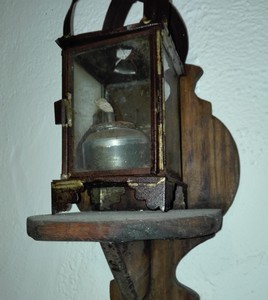 “Moses then saw how God wrote the word ‘long-suffering’ in the Torah, and asked: »Does this mean that Thou hast patience with the pious?« But God answered: »Nay, with sinners also am I long-suffering.« »What!« exclaimed Moses, »Let the sinners perish!« God said no more.”
“Moses then saw how God wrote the word ‘long-suffering’ in the Torah, and asked: »Does this mean that Thou hast patience with the pious?« But God answered: »Nay, with sinners also am I long-suffering.« »What!« exclaimed Moses, »Let the sinners perish!« God said no more.”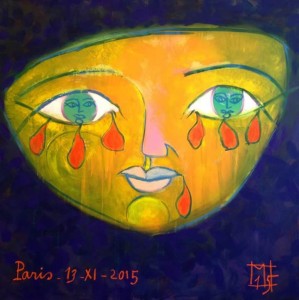 “In Heaven she is sure to find your mother again, and she is also sure to find your other grandmother. Donna Maria Vincenza assured me that if the Eternal Father does not take you directly under his protection, the three of them will raise such protests that Paradise will become a true hell...
“In Heaven she is sure to find your mother again, and she is also sure to find your other grandmother. Donna Maria Vincenza assured me that if the Eternal Father does not take you directly under his protection, the three of them will raise such protests that Paradise will become a true hell...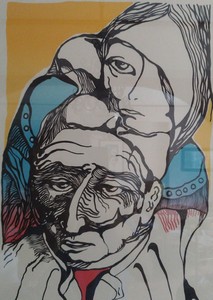 The grand-vizir himself was the father of two daughters, of whom the elder was called Scheherazade, and the younger Dinarzade. (...) One day, when the grand-vizir was talking to his eldest daughter, who was his delight and pride, Scheherazade said to him, “Father, ...I am determined to stop this barbarous practice of the Sultan's, and to deliver the girls and mothers from the awful fate that hangs over them.”
The grand-vizir himself was the father of two daughters, of whom the elder was called Scheherazade, and the younger Dinarzade. (...) One day, when the grand-vizir was talking to his eldest daughter, who was his delight and pride, Scheherazade said to him, “Father, ...I am determined to stop this barbarous practice of the Sultan's, and to deliver the girls and mothers from the awful fate that hangs over them.” 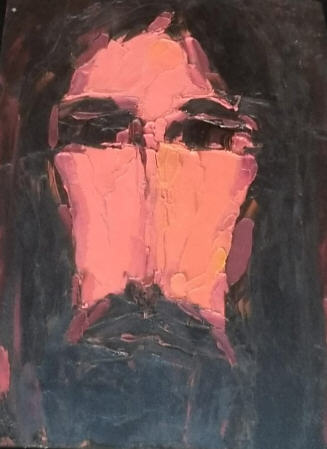 “I will not urge thee, - no nor, if thou yet shouldst have the mind, wouldst thou be welcome as a worker with me. Nay, be what thou wilt; but I will bury him... But if thou wilt, be guilty of dishonouring laws which the gods have stablished in honour.”
“I will not urge thee, - no nor, if thou yet shouldst have the mind, wouldst thou be welcome as a worker with me. Nay, be what thou wilt; but I will bury him... But if thou wilt, be guilty of dishonouring laws which the gods have stablished in honour.”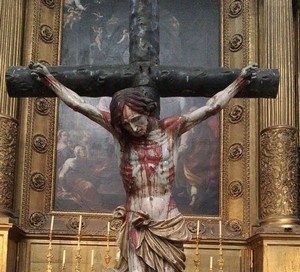 “Plato would be the one to abolish the cries of famous people and to make them the subject of common men and women, so that those whom we say we train for the defence of the country may disdain behaving in a manner similar to them".
“Plato would be the one to abolish the cries of famous people and to make them the subject of common men and women, so that those whom we say we train for the defence of the country may disdain behaving in a manner similar to them".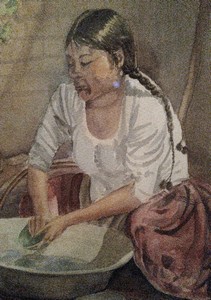 “Ulysses, noble son of Laertes, stop this warful strife, or Jove will be angry with you.” Thus spoke Minerva, and Ulysses obeyed her gladly.
“Ulysses, noble son of Laertes, stop this warful strife, or Jove will be angry with you.” Thus spoke Minerva, and Ulysses obeyed her gladly.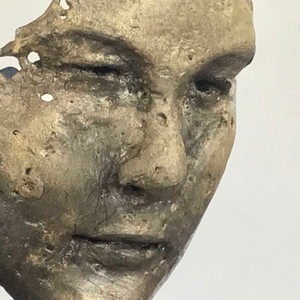 “Verily, a polluted stream is man. One must be a sea, to receive a polluted stream without becoming impure.”
“Verily, a polluted stream is man. One must be a sea, to receive a polluted stream without becoming impure.”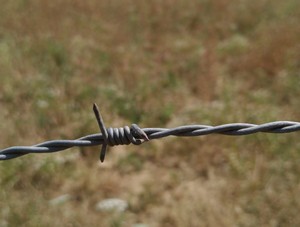 “ we but teach
“ we but teach  “Emma let the paper fall. Her first sentiment was indisposition in her stomach and knees; then she felt blind guilt, unreality, cold, fear; then she wanted it to be the next day already. She understood right afterward that this wish was useless because her father’s death was the only thing that had happened in the world and that would keep happening without end.”
“Emma let the paper fall. Her first sentiment was indisposition in her stomach and knees; then she felt blind guilt, unreality, cold, fear; then she wanted it to be the next day already. She understood right afterward that this wish was useless because her father’s death was the only thing that had happened in the world and that would keep happening without end.”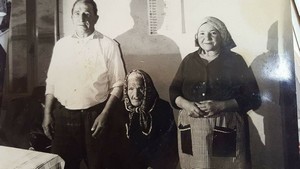 “Rabbi Pinhas said: ‘Whoever says that the words of the Torah are one thing and the words of the world another, must be regarded as a man who denies God’”.
“Rabbi Pinhas said: ‘Whoever says that the words of the Torah are one thing and the words of the world another, must be regarded as a man who denies God’”.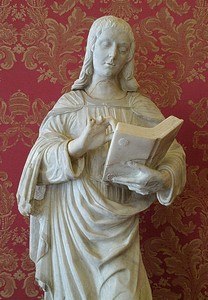 “If your heart does not wish to give in If it feels no passion, if it does not want to suffer Without making plans about what will follow My heart can love for the both of us”
“If your heart does not wish to give in If it feels no passion, if it does not want to suffer Without making plans about what will follow My heart can love for the both of us”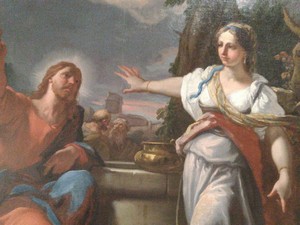 “It was by the grace of God, not on account of his merits, that Noah found shelter in the ark before the overwhelming force of the waters. Although he was better than his contemporaries, he was yet not worthy of having wonders done for his sake.”
“It was by the grace of God, not on account of his merits, that Noah found shelter in the ark before the overwhelming force of the waters. Although he was better than his contemporaries, he was yet not worthy of having wonders done for his sake.”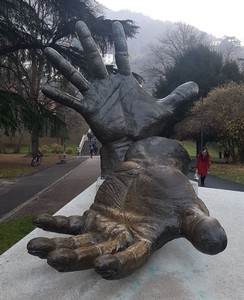 “This I-Thou relation consists of placing oneself before an outside being, i.e. one who is radically other, and in recognizing that being as such. This recognition of alterity does not consist in forming an idea of alterity. (...) It is not a question of thinking the other person, or of thinking him or her as other - but of addressing that person as a Thou.
“This I-Thou relation consists of placing oneself before an outside being, i.e. one who is radically other, and in recognizing that being as such. This recognition of alterity does not consist in forming an idea of alterity. (...) It is not a question of thinking the other person, or of thinking him or her as other - but of addressing that person as a Thou. 